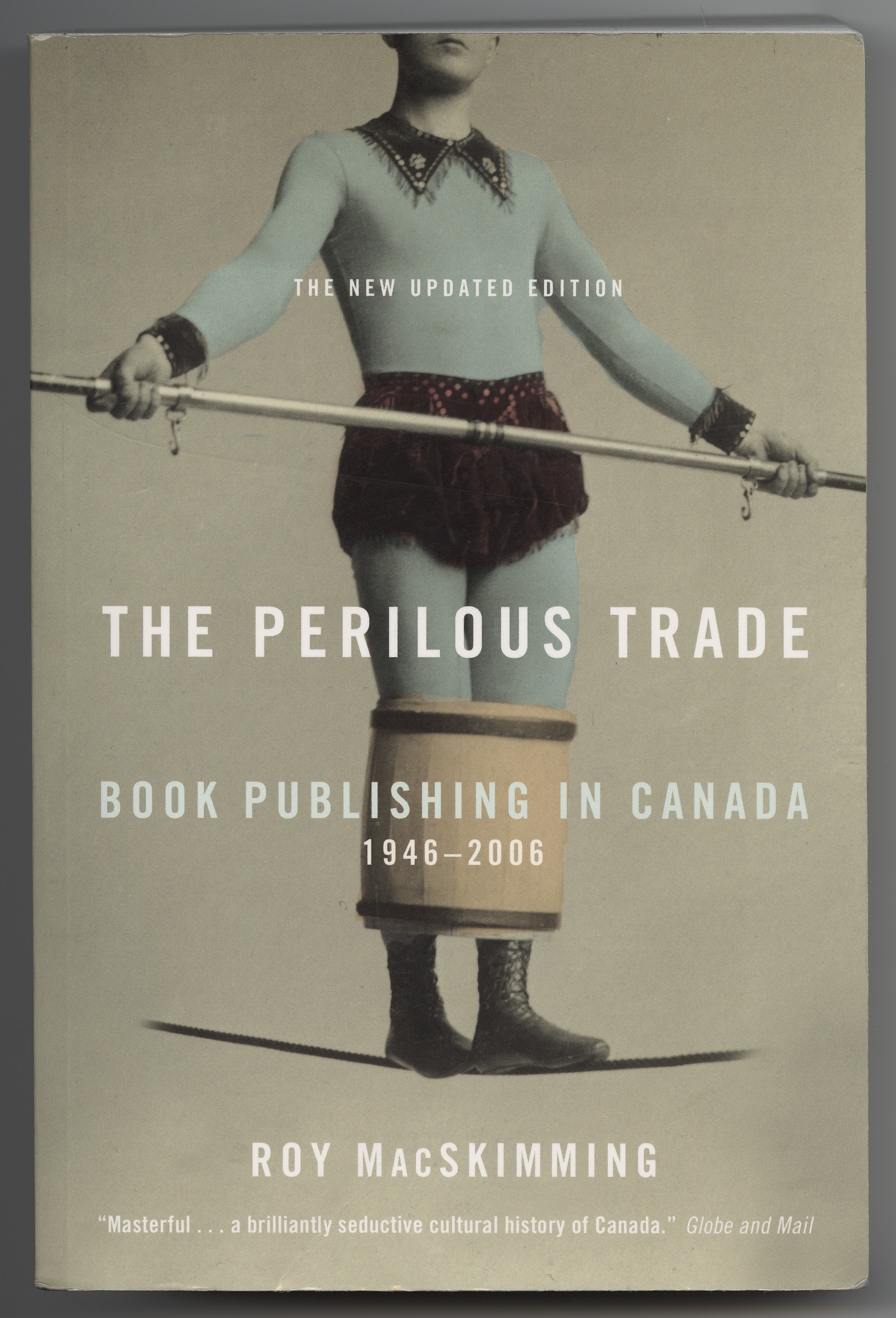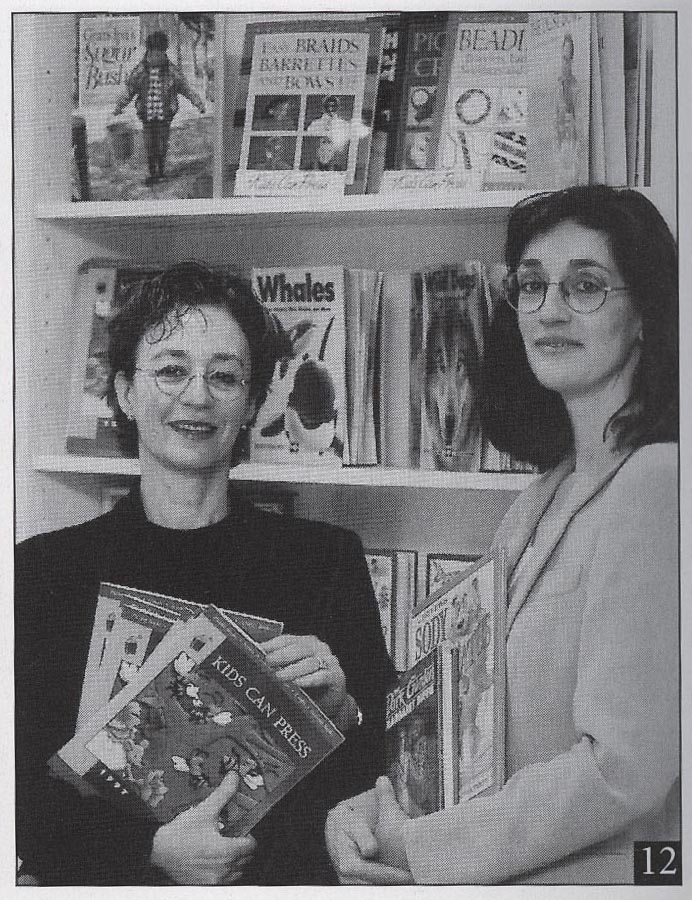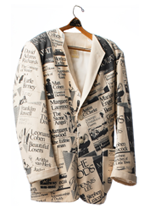The Perilous Trade Collection, with Audio Interviews
Roy MacSkimming
I wanted to write the story of Canadian publishing because I felt, in some sense, it was my story to tell.
It wasn’t that I’d worked in publishing all that long – just a decade, 1964-74, a far briefer stretch than many publishers. But my post-publishing career was all about publishing.
In the 1970s I wrote about the industry and its output as book editor and columnist for the Toronto Star. For several years I administered Canada Council funding programs for publishers across the country. At the Applebaum-Hébert commission on federal cultural policy, and later as a consultant and freelance writer, I analyzed – even psychoanalyzed – the book industry. And as policy director for the Association of Canadian Publishers, I was involved with all players in trying to better the industry’s fortunes throughout the eventful 1990s.
And so I felt, rightly or wrongly, that I knew Canadian publishing and publishers. I also knew there was a good story there, since the industry had grown exponentially and developed dramatically in the four decades I’d been involved with it. I wanted to pull together all the various strands of my professional experience and relationships into a coherent narrative – not an academic study, but a personal account that anyone interested in books could enjoy.
To bring that off, I couldn’t rely on personal experience alone. I needed the hard-won knowledge of people who had devoted their lives to publishing Canadian writers in all genres and all regions of the country. The best way to collect that knowledge was by recording personal interviews with as many protagonists as I could. Most of the events I was writing about had taken place within living memory and required multiple perspectives to be understood.
Interviews, then – with publishers, editors, authors and booksellers – constitute primary source material for the book. To document a diverse cultural industry scattered across the country, it was necessary to interview widely. In all I conducted interviews with well over a hundred people for both editions, some several times. Some interviews were recorded on audio cassettes, others in handwritten notes.
Between 1997 and 2001 I taped ninety-nine individuals for the book’s first edition. Those cassettes, along with sixty-two interview transcripts and my research files, now form part of the Roy MacSkimming fonds at the McMaster University Library.
Interviewing was also essential because relatively little historical material on modern Canadian publishing was in print. By “modern” I mean the period in which Canadian writing came of age: the half-century since the end of the Second World War. I was seized not only by the evolution of the publishing business during that period, but the contemporary literature it helped to spawn, and the ways in which publishers dealt with, inspired and infuriated their authors.
Three Canadian publishers had written their memoirs: Macmillan’s John Gray, Marsh Jeanneret of the University of Toronto Press, and Mel Hurtig. In 1998 the selected letters of Jack McClelland appeared, followed a year later by James King’s McClelland biography, Jack: A Life with Writers.
These books provided deep background on the early years of my period. Gray and Jeanneret were no longer alive (in fact Gray’s memoir ends in 1946, omitting his twenty-seven years as head of Macmillan of Canada). McClelland was in poor health by that point, his memory no longer as keen as in the past. Given the central importance of McClelland & Stewart to my story, I was glad to consult A Bibliography of McClelland & Stewart Imprints, 1909-1985, by Carl Spadoni and Judy Donnelly, for details of the rich M&S publishing program.
In addition I drew on the dated but still useful Background Papers of the Ontario Royal Commission on Book Publishing (1972), as well as the commission’s final report, much of it authored by Jeanneret. The Association of Canadian Publishers had produced a raft of policy and other documents over the years. And fragmentary histories of individual companies existed: a twenty-fifth anniversary tribute to General Publishing commissioned from Campbell Hughes, a special issue of Frank Davey’s journal Open Letter devoted to Coach House Press, a thirtieth-anniversary booklet I wrote for the House of Anansi, and Lasting Impressions: a Short History of English Publishing in Quebec by Bruce Whiteman.
Apart from these sources, the best print record of developments in the Canadian book trade lay in the archives of the trade paper Quill & Quire. Q&Q gave me the freedom to poke about among its back issues and became the most important source of photographs for my book.
But most of all I needed to capture living publishers’ voices and memories.
It took opportunity, time, and money to interview a representative range of book people from coast to coast. Fortunately, the money arrived, in the form of financial assistance for research and writing from the Department of Canadian Heritage, the Canada Council, and the Ontario Arts Council. A Canadian Studies Program grant from Canadian Heritage made it possible to have the majority of the interviews transcribed by professional typists.
I was fortunate also in the work I was doing at the time. My responsibilities at the Association of Canadian Publishers meant I travelled the country periodically to see publishers, and so I had the opportunity to sit them down with my tape recorder, whether in Montreal, Ottawa, Toronto, Edmonton, Vancouver, or Pender Island, British Columbia. While attending the 1999 BookExpo America in Los Angeles, ironically enough, I was able to interview publishers from Newfoundland and Alberta.
The criteria guiding my choice of interviewees were fairly simple. First I concentrated on elders of the book industry – those with a wider frame of reference and longer span of experience than my own. My first subject was Jack McClelland, whom I interviewed on two occasions a year apart. Others included a mix of retired publishers and senior writers, librarians, and booksellers: Pierre Berton, Harald Bohne, Gray Campbell, Bill Clarke, John Robert Colombo, Kildare Dobbs, James Douglas, Robin Farr, William French, Robert Fulford, Francess Halpenny, Dennis Lee, Louis and Rose Melzack, Gladys Neale, Peter C. Newman, Ivon Owen, Bill Roberts, Basil Stuart-Stubbs, Don Sutherland, William Toye, and Robert Weaver.
Among then-active publishers, I tried to capture leading figures in literary, children’s, scholarly, and general trade publishing. They included, among many others: Patricia Aldana, Avie Bennett, Ron Besse, Stan Bevington, Phyllis Bruce, Louise Dennys, Doug Gibson, Cynthia Good, Anne Hardy, Valerie Hussey, Malcolm Lester, James Lorimer, Allan MacDougall, Michael Macklem, Scott McIntyre, John Metcalf, Anna Porter, Clyde Rose, Ellen Seligman, Karl Siegler, Jack Stoddart, and Jan Walter.
I tried to cover representative publishers in every region of Canada where book publishing takes place. Inevitably there wasn’t time or opportunity to include everyone who ought to have been included, and so gaps exist in my research and in the book itself. I make no claim to an exhaustive or encyclopedic treatment.
I set myself one or two other limits. The most obvious was to write about Canada’s English-language publishing industry, the French-language industry being a separate world requiring its own chronicler.
Beyond that, my greatest interest was in telling the story of the industry’s indigenous, Canadian-owned sector – publishers whom I termed “the pioneers, mavericks, and idealists who risked greatly and took personal leaps of faith, often against conventional wisdom and their own financial interests.” This meant giving shorter shrift to the equally valuable but less intrinsically dramatic careers of those who run foreign-owned multinational publishers in Canada. The exceptions are publishers such as Phyllis Bruce, Louise Dennys, and John Neale who have worked in both sectors.
Interview locations varied but tended to fall into several categories: restaurants, bars, and publishers’ offices or homes. Favourite venues were the Roof Bar of the old Park Plaza in Toronto, where I interviewed Margaret Atwood, Graeme Gibson, Jim Lorimer, and Jack McClelland. My base in Vancouver was the Sylvia Hotel, where I met with Jim Douglas and Peter C. Newman. Listeners to some recordings unfortunately have to contend with the clatter of cutlery and other diners in the background – a circumstance that resulted from a desire to offer my subjects some refreshment in exchange for their memories. Acoustics were usually better when I could wangle an invitation to their office or home.

The audio clips that follow provide a sampling of the interviews conducted for The Perilous Trade. (Audio recordings for all interviews and transcripts of some are in the Roy MacSkimming fonds). Their subjects were chosen for their intrinsic interest and also to illustrate the range of publishers interviewed. The clips represent general trade (Louise Dennys and Anna Porter), literary (John Metcalf), children’s (Valerie Hussey), scholarly (Francess Halpenny), western (Jim Douglas), and educational publishing (Robin Farr). I hope listeners will share some of the excitement I felt on delving into Canada’s publishing past with these distinguished people.
A footnote: it’s worth noting that some of the interviews from the collection are also appearing, in another form, as “The Perilous Trade Conversations” in the literary journal CNQ: Canadian Notes & Queries, published in Windsor, Ontario. These are abridged versions, which I’ve edited considerably for the page, with the permission of their subjects. To date, Perilous Trade Conversations with Robert Weaver, William Toye, Jack McClelland, Margaret Atwood/Graeme Gibson, Dave Godfrey/Dennis Lee, and Stan Bevington/Victor Coleman have appeared in various issues of CNQ.
Audio Interviews (see below)
[Additional transcripts of interviews will be uploaded as they become available.]
In addition to the interviews below, an interview by Roy MacSkimming with Gladys Neale accompanies the study Catching Sight of the Battle: Gladys Neale's Rise to the Top of Educational Publishing (with audio recording)
Louise Dennys The interview took place in Louise Dennys’s office at Random House of Canada on Yonge Street, Toronto, on 26 August 1999. Dennys went to Random House in 1991 to head up the new Canadian imprint of Alfred A. Knopf. Since then Knopf has published an extensive list of leading Canadian authors, and Dennys has become executive publisher of Random, Knopf, and Vintage Canada. This excerpt recounts her previous experience (1978-91) as Malcolm Lester’s partner in the influential literary publishing house Lester & Orpen Dennys.
The interview took place in Louise Dennys’s office at Random House of Canada on Yonge Street, Toronto, on 26 August 1999. Dennys went to Random House in 1991 to head up the new Canadian imprint of Alfred A. Knopf. Since then Knopf has published an extensive list of leading Canadian authors, and Dennys has become executive publisher of Random, Knopf, and Vintage Canada. This excerpt recounts her previous experience (1978-91) as Malcolm Lester’s partner in the influential literary publishing house Lester & Orpen Dennys.
Anna Porter
This interview, the first of two conducted with Anna Porter in late 1998, took  place on 20 October at her office in the Key Publishers building near Toronto harbour. Before co-founding Key Porter Books in 1982, Porter was editorial director and vice-president at McClelland & Stewart, where she began working in 1969 after a stint in publishing in London. Here she recalls the grand adventure of working alongside Canada’s greatest publisher, Jack McClelland.
place on 20 October at her office in the Key Publishers building near Toronto harbour. Before co-founding Key Porter Books in 1982, Porter was editorial director and vice-president at McClelland & Stewart, where she began working in 1969 after a stint in publishing in London. Here she recalls the grand adventure of working alongside Canada’s greatest publisher, Jack McClelland.
John Metcalf
As a writer who discovers and publishes other writers, the English-born John Metcalf has always felt a powerful sense of mission. After editing numerous anthologies and textbooks for a variety of publishers, Metcalf became the driving editorial force behind Tim and Elke Inkster’s literary press, The Porcupine’s Quill, in Erin, Ontario, throughout the 1990s. He moved to a new venture, Biblioasis, in 2004. In this excerpt from the interview, Metcalf describes his philosophy of discovering new writers, and his methods of working with them. The interview took place in Ottawa at the Elgin Street Diner, operated by Metcalf’s stepson, on 2 November 1999.
Valerie Hussey Originally from New York, where she worked in educational publishing, Valerie Hussey joined Kids Can Press, a cooperative children’s publishing venture in Toronto, in 1979. In the interview she describes her early days at Kids Can before she and her business partner, Ricky Englander, built the press into a much larger company and sold it to Nelvana animation studios in 1998. Hussey remained as president for some years afterwards. The interview, conducted at her office in midtown Toronto, took place 19 May 1999.
Originally from New York, where she worked in educational publishing, Valerie Hussey joined Kids Can Press, a cooperative children’s publishing venture in Toronto, in 1979. In the interview she describes her early days at Kids Can before she and her business partner, Ricky Englander, built the press into a much larger company and sold it to Nelvana animation studios in 1998. Hussey remained as president for some years afterwards. The interview, conducted at her office in midtown Toronto, took place 19 May 1999.
Francess Halpenny
The interview was conducted in Francess Halpenny’s office in the Robarts  Library, University of Toronto, on 23 October 1998. Halpenny joined the University of Toronto Press as a young editor in 1941. After Marsh Jeanneret’s arrival as director of UTP, she headed the editorial department during a time of tremendous expansion, eventually becoming general editor of The Dictionary of Canadian Biography. Concurrently with her work at University of Toronto Press, Halpenny was dean of the University of Toronto’s Faculty of Library Science (now Faculty of Information), where she shaped a generation of Canadian librarians as she had once shaped major scholarly projects and manuscripts.
Library, University of Toronto, on 23 October 1998. Halpenny joined the University of Toronto Press as a young editor in 1941. After Marsh Jeanneret’s arrival as director of UTP, she headed the editorial department during a time of tremendous expansion, eventually becoming general editor of The Dictionary of Canadian Biography. Concurrently with her work at University of Toronto Press, Halpenny was dean of the University of Toronto’s Faculty of Library Science (now Faculty of Information), where she shaped a generation of Canadian librarians as she had once shaped major scholarly projects and manuscripts.
James Douglas Jim Douglas is an influential pioneer of the book business in British Columbia and the Canadian west. From his native Edinburgh, Douglas moved to Vancouver and worked as a commissioned sales rep for McClelland & Stewart and Macmillan before founding his own sales agency. In 1971 he created the publishing firm J.J. Douglas Ltd., developing a strong trade list that was regional, national, and international. When he was joined by partner Scott McIntyre, the company became Douglas & McIntyre, today one of the major Canadian-owned publishers. Douglas retired from D&M in 1980. The interview, the first of two with Douglas, took place 4 February 1998 in the Sylvia Hotel.
Jim Douglas is an influential pioneer of the book business in British Columbia and the Canadian west. From his native Edinburgh, Douglas moved to Vancouver and worked as a commissioned sales rep for McClelland & Stewart and Macmillan before founding his own sales agency. In 1971 he created the publishing firm J.J. Douglas Ltd., developing a strong trade list that was regional, national, and international. When he was joined by partner Scott McIntyre, the company became Douglas & McIntyre, today one of the major Canadian-owned publishers. Douglas retired from D&M in 1980. The interview, the first of two with Douglas, took place 4 February 1998 in the Sylvia Hotel.
Robin Farr
Robin Farr’s publishing career began at Copp Clark, then an important educational firm in Toronto. In 1960 Farr became founding director of McGill (now McGill-Queen’s) University Press, returning to Toronto for stints with Ryerson Press and McClelland & Stewart. In 1972 he went to the Canada Council to design and implement the Block Grant program, a role in which he exercised a critical influence on government publishing policy. He rounded out his career running publishing and other programs for the Ontario government. This excerpt from an interview at Farr’s home on 21 October 1998 is evocative of Canadian publishing in the 1950s.
General:
MacSkimming, Roy. The Perilous Trade: Publishing Canada’s Writers. Toronto: McClelland & Stewart, 2003.
—. The Perilous Trade: Book Publishing in Canada 1946-2006. Toronto: McClelland & Stewart, 2007.
Anna Porter
Trush, Mary. “The Queen Bee of Canadian Publishing” [Case study on this website.]
John Metcalfe
http://www.biblioasis.com/
http://porcupinesquill.ca/
Valerie Hussey
http://www.kidscanpress.com/Canada/
http://www.rotman.utoronto.ca/cweya/pastwinners1997.htm
Frances G. Halpenny
http://www.collectionscanada.gc.ca/women/002026-286-e.html
James Douglas
http://www.dmpibooks.com/home
Roy MacSkimming fonds, McMaster University



![The better part of valour; essays on Canadian diplomacy [by] John W. Holmes](/sites/default/files/styles/thumbnail/public/canpub/CP000027.jpg?itok=RejAwCFp)






![Postcard of Elevator foundation at Port Colborne, Ont. published by the Copp Clark Co. Limited-Toronto, [1906]](/sites/default/files/styles/thumbnail/public/canpub/CP000032.jpg?itok=6kob4bg9)
![Postcard of Elevator foundation at Port Colborne, Ont. published by the Copp Clark Co. Limited-Toronto, [1906]](/sites/default/files/styles/thumbnail/public/canpub/CP000032-2.jpg?itok=7LEn-mlC)



